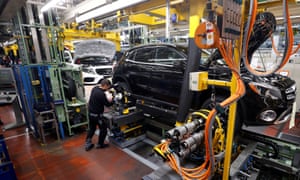Mercedes-Benz owner aims to slash €1bn from wage bill in drive towards to electric cars

Carmakers such as Daimler are cutting staff to save costs during the move towards electric vehicle production.
Photograph: Kai Pfaffenbach/Reuters
Daimler has announced plans to cut at least 10,000 jobs worldwide in the latest sign of stress in the German automotive industry as it invests billions in electric cars.
Daimler, which owns Mercedes-Benz and also makes lorries, vans and buses, said on Friday it planned to cut thousands of jobs by the end of 2022, but later made it clear the toll would be higher.
“The total number worldwide will be in the five-digits,” the personnel chief, Wilfried Porth, told journalists. The company will cut one in 10 of its managers worldwide.
Mercedes-Benz, the maker of premium and luxury cars, outlined plans to save €1bn in staff costs this month, and union bosses suggested 1,100 jobs could go.
Daimler’s move is the latest sign of the massive disruption facing the German car industry as it makes the historic move away from producing cars with internal combustion engines towards battery electric vehicles. At the same time, profitable diesel sales have slumped after emissions cheating scandals, and the runaway growth of sales in China has stopped.
Battery electric cars are crucial to meet EU regulations coming into force in January that promise to impose fines potentially running into billions of euros on carmakers which do not reduce average carbon dioxide emissions below 95g per kilometre.
Volkswagen’s Audi on Tuesday said it would cut up to 9,500 jobs at its German factories by 2025 to save €6bn. In March, the Volkswagen brand said it planned to make 7,000 job cuts, to save €5.9bn and allow it to hire more staff to work on digital technology. BMW reportedly plans to cut as many as 6,000 jobs in Germany by 2022.
Daimler, which made profits of €7.6bn last year, said it had agreed to use “natural fluctuation” to cut job numbers across the group, as well as offering “part-time retirement” and a severance programme in Germany to cut the number of administration workers. Assembly line workers – who are subject to a jobs guarantee up until 2029 – are not included in the figures.
In a statement, Daimler said: “The automotive industry is in the middle of the biggest transformation in its history. The development towards CO2-neutral mobility requires large investments.”
The carmaker, which employs about 300,000 globally, has been increasing its spending on research and development in recent years but has yet to launch a mainstream electric vehicle. Its Mercedes-Benz EQC electric SUV is due to go on sale 2020.